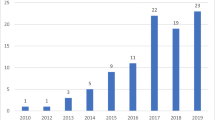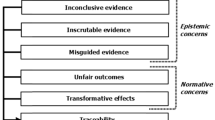Abstract
In 2016, the Telecom Regulatory Authority of India issued the Prohibition of Discriminatory Tariffs for Data Services Regulations. It favours the principle of internet neutrality. This principle suggests that all data on the internet should be treated equally without discrimination by user, content, site, etc. The objective of this paper is to justify the idea that internet neutrality cannot ensure equality in the ethical sense. Net neutrality can only maintain technological equality. The author proposes the argument that technological equality is not the same as ethical equality. Treating all content, which is not homogenous, equally leads to unethical activities. It hampers an individual’s relationship with his or her society and, thereby, blocks the foundation for social justice. Accordingly, the neutrality principle ignores the idea of social justice and fails to protect human rights. Hence, it cannot be ethically justifiable in its present form.
Similar content being viewed by others
References
Abbot, J. 2012. Democracy@internet.org Revisited: analysing the socio-political impact of the internet and new social media in East Asia. Third World Quarterly 33(2): 333–357.
Anand, U. 2015. Background and legal aspects of the ban on internet pornography. The Indian Express.
Baker, C.R. 1999. An analysis of fraud on the internet. Internet Research 9 (5): 348–360.
Beckett, D. 2000. Internet technology. In Internet Ethics, ed. D. Langford, 73–75. London: Palgrave Publication.
Belly, L., and P.D. Filippi. 2016. General introduction: Towards a multistakeholder approach to net neutrality. In Net Neutrality Compendium, ed. L. Belly, and P.D. Filippi, 1–4. London: Springer.
Boatright, J.R. 2007. Ethics and the Conduct of Business. India: Pearson Education.
Burkell, J., and I.R. Kerr. 2000. Electronic miscommunication and the defamatory sense. Canadian Journal of Law and Society 15(1): 81–110.
Cohen-Almagor, R. 2012. Content net neutrality—A critique. In Luciano Floridi’s Philosophy of Technology, ed. H. Demir, 151–156. New York: Springer.
Cook, D. 2006. Criminal and Social Justice, 60–72. London: Sage Publication.
Copy, I.M., C. Cohen, P. Jetli, and M. Prabhakar. 2006. Introduction to Logic, 386–387. New Delhi: Pearson Education.
Craven, A. 2012. Social justice and higher education. Perspectives 16(1): 23–28.
Gaete, R. 1991. Postmodernism and human rights: Some insidious questions. Law and Critique 2(2): 149–150.
Hoynck, T. 1996. Public reason-making law reasonable to the public. International Journal for the Semiotics of Law 9(2): 213–218.
Kshetri, N. 2010. Diffusion and effects of cybercrime in developing economies. Third World Quarterly 31(7): 1057–1079.
Kuruvilla, C. 2015. Why 12 Top Religious Leaders Are Proud To Support Net Neutrality. The Huffington Post, Retrieved from (http://www.huffingtonpost.com/2015/06/12/religious-leaders-on-net-neutrality_n_7562454.html?ir=India&adsSiteOverride=in).
Linden, H.V.D. 1988. Kantian Ethics and Socialism, 15. Cambridge: Hacket Publishing Company.
Ma, H.K. 2011. Internet addiction and antisocial internet behavior of adolescents. Scientific World Journal 11: 2187–2196.
Murray, A.D. 2003. Regulation and rights in networked space. Journal of Law and Society 30(2): 187–216.
Narayan, V. 2013. Most online criminals are educated youths: report. The Times of India, Retrieved from http://timesofindia.indiatimes.com/city/mumbai/Most-online-criminals-are-educated-youths-Report/articleshow/20672686.cms.
Nussabaum, M.C. 2011. Creating Capabilities—The Human Development Approach, 7–120. Cambridge: Harward University Press.
Oman, N. 1996. On the universalizability of human rights. The European Legacy 1(2): 526–531.
Pendleton, M.D. 2016. Computer programs, internet copyright and trips border control. Asia Pacific Law Review 7(1): 133–137.
Rosenberg, R.S. 2001. Controlling access to the internet: The role of filtering. Ethics and Information Technology 3: 35–54.
Singh, P.J. 2016. What free basics did not intend to do. The Hindu 11. http://www.thehindu.com/opinion/op-ed/What-Free-Basics-did-not-intend-to-do/article14470921.ece.
Thomas, D.S., K.A. Forcht, and P. Counts. 1991. Legal considerations of internet use- issues to be addressed. Internet Research 8(1): 70–74.
Travis, A. 2015. Crime rates to rise by 40% after inclusion of cyber offences. The Guardian. https://www.theguardian.com/uk-news/2015/oct/15/crime-rate-rise-cyber-offences.
The Economic Times. 2015. Cyber crimes in India likely to double to 3 lakh in 2015: Report.
TRAI, Gazette of India, February 08, 2016. (Accessed from http://www.trai.gov.in/WriteReadData/WhatsNew/Documents/Regulation_Data_Service.pdf).
Upham, A.R. 2016. Interfacing with pornography: An examination of Hong Kong’s approach to pornography on the internet. Asia Pacific Law Review 9(2): 151–172.
Vedder, A. 2001. Accountability of internet access and service providers—Strict liability entering ethics? Ethics and Information Technology 3: 67–74.
Vedder, A., and R. Wachbroit. 2003. Reliability of information on the internet: Some distinctions. Ethics and Information Technology 5: 211–215.
Weckert, J. 2000. What is new or unique about internet activities. In Internet Ethics, ed. D. Langford, 61–62. London: Palgrave Macmillan.
Welch, J.P. 2015. http://www.e-ir.info/2015/04/15/net-neutrality-and-its-relationship-to-national-security/.
Winston, M. 2007. Human rights as moral rebellion and social construction. Journal of Human Rights 6(3): 279–305.
Wood, H. 2013. Internet pornography and paedophilia. Psychoanalytic Psychotherapy 27(4): 319–338.
Young, G. 2005. Ethics of access: Globalization, feminism and information society. Journal of Global Ethics 1(1): 69–84.
Author information
Authors and Affiliations
Corresponding author
Rights and permissions
About this article
Cite this article
Cheruvalath, R. Internet Neutrality: A Battle Between Law and Ethics. Int J Semiot Law 31, 145–153 (2018). https://doi.org/10.1007/s11196-017-9531-z
Published:
Issue Date:
DOI: https://doi.org/10.1007/s11196-017-9531-z




